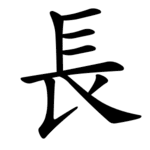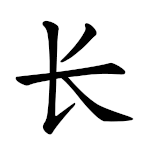Radical 168
Radical 168 or radical long (長部) meaning "long" or "grow" is one of the 9 Kangxi radicals (214 radicals in total) composed of 8 strokes.
| 長 | ||
|---|---|---|
| ||
| 長 (U+9577) "long, grow" | ||
| Pronunciations | ||
| Pinyin: | cháng | |
| Bopomofo: | ㄔㄤˊ | |
| Wade–Giles: | ch'ang2 | |
| Cantonese Yale: | cheung4, jeung2 | |
| Jyutping: | coeng4, zoeng2 | |
| Japanese Kana: | チョウ chō / ジョウ jō (on'yomi) なが-い naga-i (kun'yomi) | |
| Sino-Korean: | 부 jang | |
| Hán-Việt: | trường, trưởng, tràng | |
| Names | ||
| Japanese name(s): | 長い/ながい nagai | |
| Hangul: | 길장 gil | |
| Stroke order animation | ||
 | ||

Stroke order of the simplified form 长
In the Kangxi Dictionary, there are 55 characters (out of 49,030) to be found under this radical.
长, the simplified form of 長, is the 83rd indexing component in the Table of Indexing Chinese Character Components predominantly adopted by Simplified Chinese dictionaries published in mainland China, with a variant form 镸 and the traditional form 長 listed as its associated indexing components.
Evolution
 Oracle bone script character
Oracle bone script character Bronze script character
Bronze script character Small seal script character
Small seal script character
Sinogram
As an independent sinogram 長 is one of the Kyōiku kanji or Kanji taught in elementary school in Japan. It is taught in second grade[1]
Look up 長 in Wiktionary, the free dictionary.
References
- "The Kyoiku Kanji (教育漢字) - Kanshudo". www.kanshudo.com. Archived from the original on March 24, 2022. Retrieved 2023-05-06.
Further reading
- Fazzioli, Edoardo (1987). Chinese calligraphy : from pictograph to ideogram : the history of 214 essential Chinese/Japanese characters. calligraphy by Rebecca Hon Ko. New York: Abbeville Press. ISBN 0-89659-774-1.
- Lunde, Ken (Jan 5, 2009). "Appendix J: Japanese Character Sets" (PDF). CJKV Information Processing: Chinese, Japanese, Korean & Vietnamese Computing (Second ed.). Sebastopol, Calif.: O'Reilly Media. ISBN 978-0-596-51447-1.
This article is issued from Wikipedia. The text is licensed under Creative Commons - Attribution - Sharealike. Additional terms may apply for the media files.